



Kiddy Grade has had a troubled upbringing: originally aired in 2002 by a still vaguely respectable Gonzo, it was an unremarkable series until past the half-way point when it briefly became excellent then dipped back down to a simmering mediocre. Notable only insofar that it was directed by Keiji Gotoh who also did the superb Martian Successor Nadesico, apart from the enduring appeal of its numerous racy promo images it sank without a trace. Four years later a sequel was announced and a teaser released shortly afterwards; the full product failed to materialise until almost two years after that with Kiddy Girl-and. The wait hasn't been particularly unbearable, it has however been long enough to forget the minutiae of the first series.
A plot strapped to this ship will only expedite its sinking
All semblance of plot, characters and sense are thrown out the window leaving a colourful, high-pitched husk of a series. The lead character is nauseatingly upbeat and with a voice that sounds like a cat attacking a chalkboard, a sonic assault that is worsened by the insipid plot lines of the first three episodes. From breaking into a "high security" area to secure some dessert to a tedious argument between partners, it feels like a regression to a neolithic phase of storytelling: all cudgels and grunts with a total lack of subtlety. That it features an underwear plot in the first episode (something the seminal My-HiME waited for the fourth episode for) and a bath scene in the opening minutes of the second demonstrates just how keen this series is to attract viewers.
Read the rest of this entry

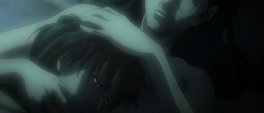
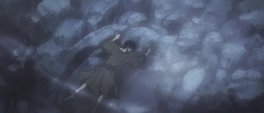
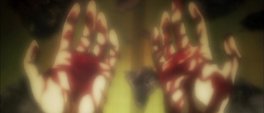
Based upon well-known Japanese literature, no opening music and a simple perfunctory closing animation, Aoi Bungaku could barely be more art-house. It's an odd situation coming from a media that is still mostly marginalised, even in its country of origin: aiming for a further niche would seem counter-intuitive especially for something with such stunning production values.
when the only noticeable fault is a merely proficient soundtrack, one knows that the series is something particularly special
At times it is breathlessly beautiful, judicious use of soft filters and colour grading means everything has an ephemeral reality to it - helped by a keen eye for details in the most fleeting of scenes. Combined with a story of childhood, loss, sex, suicide and emotion it's dangerously easy to fall in love with the series and be utterly enthralled by it. A live action introduction by Sakai Masato, notable drama actor, explains the aim of the series is to introduce viewers to well known stories, the first of which is "No Longer Human" by Dazai Osamu. At only twelve episodes long and six works to get through, the first story is the longest occupying four complete episodes and tells the life of the troubled Yozo Oba.
Read the rest of this entry


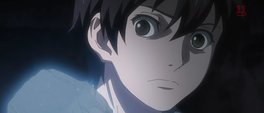
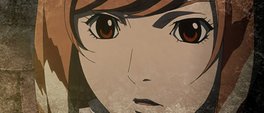
It's somewhat of a shame that (to give its full name) Tatakau Shisho: The Book of Bantorra uses ALI Project for the opening song; it raises the question of whether the group have any range beyond fast-paced anime openings. Regardless, Bantorra is a refreshingly dark show set in a fictional world where upon peoples' deaths, they are transformed into "books" which are stored and tended by the combat-orientated Librarians. This setup is made more palatable than the recent Toshokan Senso (Library War) with these Librarians all wielding magical powers and fighting against a group which makes mindless suicide bombers out of ordinary civilians.
As with most first episodes, pomp and flash is favoured over function
The first episode is a riot of new terms, explosions, magic and cryptic dialogue; starting with an assault on a freighter that is subsequently scuttled, the following episodes get stuck in to the plot which concerns a long dead villain who once brought death to the lands and the resurrection of a vicious plague. The story switches between one of the emotionally numb body-bombs ("Meats") who finds a fragment of the malefactor's book, the arrogant and overpowered acting director of the Librarians - Hamutz Meseta - and a brutal member of the opposing faction, a "True Man". It's pure fantasy padding and marvellously imaginative.
Read the rest of this entry




Unimaginative. Tired. Bland. Tedious. Insipid. The list of derogatory descriptions for Kämpfer is lengthy but suffice to say the utter lack of inspiration the series demonstrates is quite staggering. Cherry picking the most aggravating elements from other shows and combining them into a thoroughly banal presentation of gender swapping and fighting females which, on the face of it, is a combination ripe for exuberance.
the proclivities of the entire school population wielding an XX chromosome seem ridiculously tame
The opening scene is enough cause for one to turn off and continue no further: a luminous red-head shooting at a fluorescent blue-haired buxom female running and darting about conspicuous trees while her clothes are seductively shredded. Were it not for the next scene, a comparative master class in introductions, the series would be starting off at the very bottom of the entertainment hill. The inaugural episodes oscillate from apathetic combat to surprisingly gratifying school humour and only seems to hit its stride in the third which introduces a plethora of débutantes eager to ravish the goofy protagonist who woke up one morning a different sex than that which he went to bed.
Read the rest of this entry




Understating Kimi ni Todoke would be to say that it is saccharine: one cannot help but grin moronically at the continuing quest of Sawako Kuronuma to ingratiate herself with her school mates. Afflicted with the curse of rumour, she starts the series alone and subject to spurious tales of bringing curses upon those that slight her and it is only through the attention of the affable Shota Kazehaya that she is able to propel herself from quiet and alone to quiet with friends. It's deftly done, especially in three episodes, and with at least two thirds of the series remaining the story is sure to evolve well.
The greatest problem that the series could face is becoming mired in petty backbiting
Beginning at the start of the summer holiday, the set up is perfect for a "Grease" style tale of warm-weather romance and inevitable school alienation. But the story defies expectations and skips ahead to the following term, awkward greetings and new teachers in tow. From there Sawako succeeds in making friends and, if the fourth episode preview is anything to go by, at least one enemy: gaining the affections of a popular figure was always going to raise someone's ire. It is a simple story well told and it is the pace and legitimacy of the characters, especially the painfully adorable Sawako, that shoot this otherwise slow burner well-above it's more sedate contemporaries.
Read the rest of this entry



















